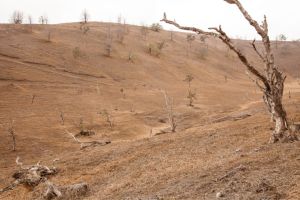Malo‘o ka lani, wela ka honua (When the sky is dry, the earth is parched): Investigating the cultural dimensions of indigenous local knowledge responses to changing climate conditions
Hawai‘i’s isolation, paired with limited water resources, make the archipelago sensitive to reductions in water availability. Drought can take different forms, varying across Island geographies with respect to frequency, intensity, duration, and extent. A drought event can exert hydrological, agricultural, ecological, and socio-economic impacts – and these impacts have been growing over the past century as droughts have become more frequent and severe. While the impacts of drought in Hawai‘i have been recently documented, important gaps remain in understanding these dynamics when engaging with multiple other stressors such as invasive species, shifting fire and climate patterns, pests, and pathogens. In particular, the drought experiences of indigenous and local knowledge holders within the archipelago has not been well studied.

Gaining a better understanding of biocultural approaches (i.e. how original inhabitants of these islands dealt with stressors such as drought) can provide broad insight into how society can prepare for, adapt to, and mitigate the impacts of drought condition across sectors. Realizing how community members relied on indigenous knowledge systems to approach, prepare for, and recover from environmental events represents an important but underutilized path to enhanced socio-ecological resilience.
This research aims to complete a preliminary survey of Hawaiian knowledge from text information sources. More specifically, it will include: 1) a detailed historical analysis of traditional texts and newspapers; 2) a synthesis of drought information garnered from Hawaiian language chants; and 3) a survey of drought conditions. The work proposed here will provide foundational “biocultural lessons learned” insights for building strategies to address drought impacts and is targeted towards stakeholders that include climate and conservation networks and place based organizations.
PROJECT DETAILS
FUNDED:
FY2020
PI:
Christian Giardina
Research Ecologist, Inst. of Pacific Islands Forestry, US Forest Service
Co-PI:
Katie Kamelamela
Postdoctoral Researcher, Akaka Foundation for Tropical Forests
Collaborators:
Tamara Ticktin
UH Mānoa
Rosie Alegado
UH Mānoa
Noa Lincoln
UH Mānoa
Kalei Nuʻuhiwa
M.A. Akaka Foundation for Tropical Forests
Abby Frazier
East-West Center
Puʻuwaʻawaʻa Community Based Subsistence Forestry Area
Protect Kahoʻolawe ʻOhana
Kuaʻāina Ulu ʻAuamo

